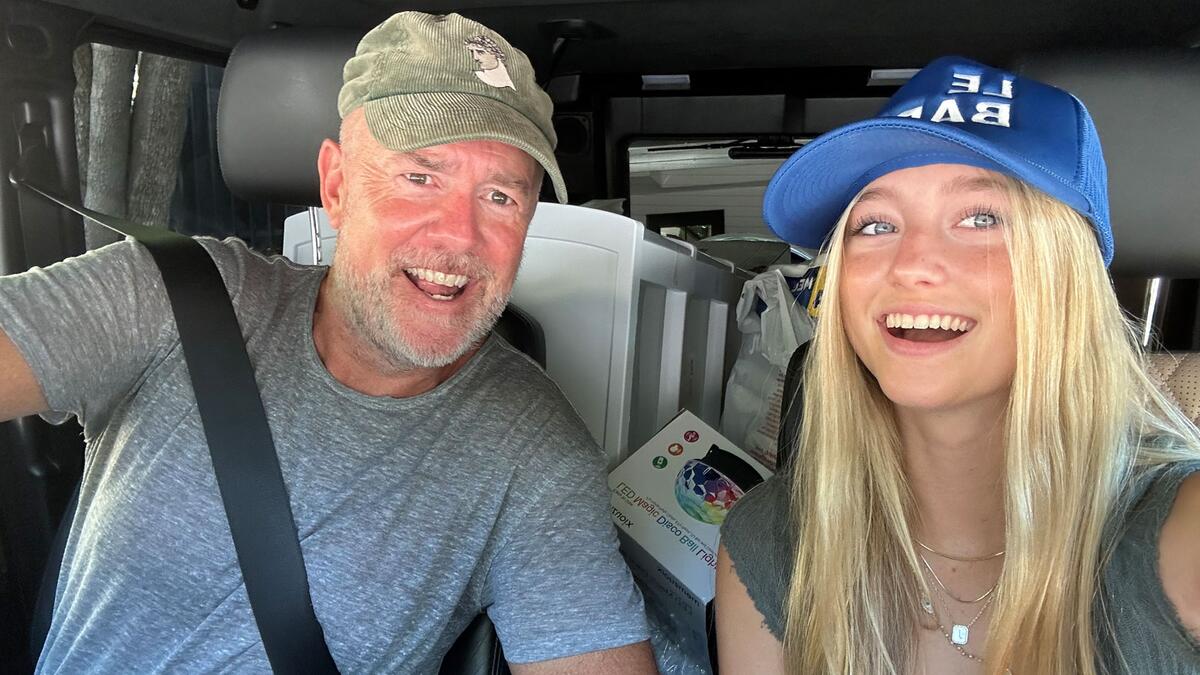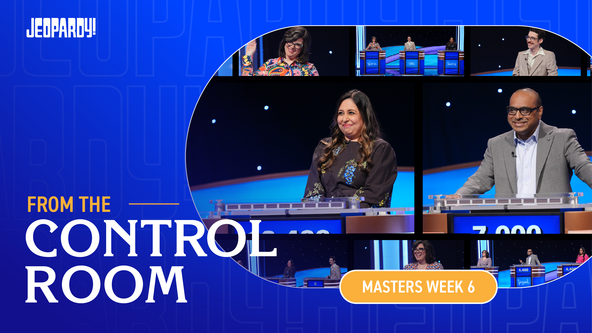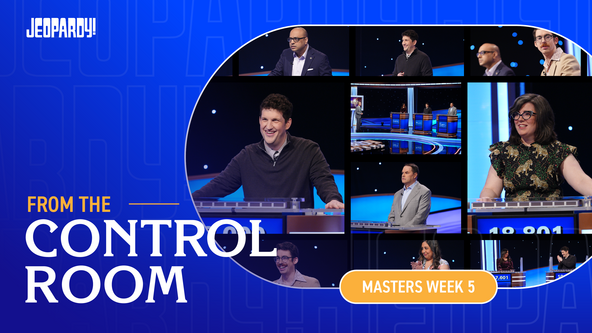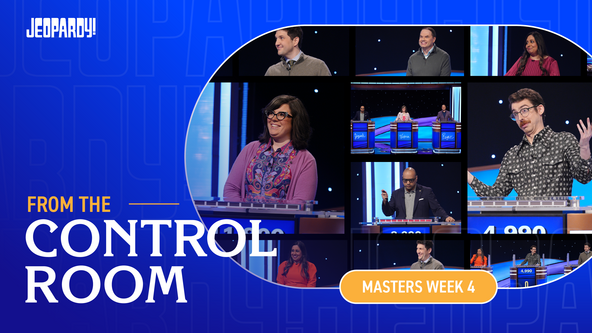Featured J!Buzz
The Making of a Producer
With another season of Jeopardy! Masters in the books, and a few weeks until the premiere of Who Wants to be A Millionaire, I thought I would do something a little different this week.
A few weeks ago, I sat for an interview with one of the toughest hacks in the business: my daughter, JJ, a rising Junior at Dodge College of Film and Media Arts. She’s actually training to be a flack and has wanted to work in entertainment PR ever since she was 15. She found the perfect program at Dodge, one of the top film schools in the country - PRAEM, which stands for Public Relations, Advertising, and Entertainment Marketing - all taught by industry professionals at a state-of-the-art production facility on the campus of Chapman University in Orange, California.
If you or someone you know is interested in a career in television or film, look into it. There are all sorts of specializations offered for directing, creative producing, animation, screenwriting, documentary production, and so many more. Including PR!
___________________________________________________________________________________________
The Final Answer Heard Round The World: An Interview with Michael Davies
Michael Davies is a British award-winning television producer and the current showrunner of Jeopardy!, with a storied career spanning live TV, game shows, and sports entertainment.
In this interview, Davies reflects on his early inspirations and pivotal career moments, discusses the enduring value of writing in television production, and shares behind-the-scenes stories that reveal his creative philosophy and passion for collaboration.
JJ Davies: What originally drew you to the world of media and storytelling?
Michael Davies: Growing up in London in the 1970s and 80s, I felt like media was all around me. We had way less choice back then, only three TV channels for example (until Channel 4 was founded in late 1982), but there is a certain energy created by everyone watching and reading the same news, seeing the same TV shows and movies, and reading the same books. I was always a massive consumer of comic books and children’s reference books. It’s still where most of my knowledge of history and geography comes from - and, being books for children, storytelling was a huge element of those titles, even the non-fiction ones. The radio was also always on in my house, which had news, magazine shows, comedy panel shows, and even a soap opera and dramas. Late at night, I would sneak my transistor radio under the covers and listen to radio from all over Europe.
JJ Davies: Can you remember a pivotal moment early in your career that made you say, “Yes, this is what I’m meant to do”?
Michael Davies: When I was 23, I landed a summer job working as a runner at a film production company run by my brother’s girlfriend and future wife. We were making 30-second television commercials and would spend weeks pre-producing and weeks in post for just 30 seconds of content. I found it fascinating but also somewhat slow-moving. They did, however, let me hire my best friend Scoops when we needed more help on shoots. And during one of those shoots, we got invited by another production assistant to go to a live recording of a brand-new music show for Channel 4 - Big World Café, I think it was called - with a big live audience that was shooting at the same studios. The show went live at 9 p.m., with three musical acts playing on three stages separated by about 400 of us in the crowd. The energy was electric - production people running around wearing headsets yelling into walkie talkies, cameras flying around on jibs, guitarists and drummers tuning and warming up on three separate stages, and one minute before it all went live, the director came over the SA, the public announce, and told us that he wanted “a bunch of energy from you guys!” He also told us “don’t look in the cameras!” and that we were about to have “the best night of your lives!” And I turned to Scoops and said, “Whatever this is, this is what I want to do”. Three months later, I got my first job in multi-camera live television. And 36 years later, I’m still working in live and live-to-tape shows - events, quiz shows, late night, and music. Moreover, Scoops is now the Managing Director of the film production company we were working for at the time, and one of the most successful commercials producers in the world. So I guess being there changed both of our lives that night.
And amazingly, I just found on YouTube one of the performances from that night -
JJ Davies: Was there a specific challenge in your early career that shaped the way you approach projects today?
Michael Davies: I would say every single TV project I have ever been involved in from my earliest days as a freelancer and writer, through my executive days at Disney and ABC, to my producing career at Embassy Row and Sony has had a moment when it seemed impossible or like it was never going to happen or all going to blow up. Producing is, essentially, about preventing that from happening. The Golden Rule of show business is, after all, the show must go on. I think when I was part of the team that pulled off the first ever major project I worked on, starring an unknown stand-up comedian who worked at Boeing, and raised $400,000 from a government organization I’d never heard of to fund it. That show became “Bill Nye The Science Guy,” and everything seemed achievable afterwards.
JJ Davies: Who were some of your biggest creative or professional influences growing up?
Michael Davies: Well, my brother, Will, has been a tremendous influence. He came to America before me and became a very successful screenwriter. Even though what we do is very different, he showed me that it was possible for a kid who grew up in my house, with my parents, on my street, to move to the other side of the world and succeed in Hollywood. His ex-girlfriend and wife, who hired me at that film production company (your auntie Lizie, JJ!), was the first person who really believed in me and taught me what a producer does. I was really lucky to have some early bosses, particularly at Disney and ABC, who gave me tremendous creative freedom while also teaching me a lot. And then, of course, I worked for Merv Griffin when I first moved to LA. Only recently, now that I have taken over Jeopardy!, do I realize how valuable that experience was. And bizarrely, the other influence is having played competitive tennis as a junior, in college, and now as a senior. I have spent a lifetime chasing that adrenaline in my professional career.
JJ Davies: You’ve worked across television, podcasting, and sports entertainment. How do you approach storytelling differently depending on the medium?
Michael Davies: I think my secret is I don’t approach any of it differently. That might also be a fault. I always start with the written concept and a lot of writing to develop any idea. And then develop the visual side of the concept to go along with that. A lot of the time, I am working with phenomenal talent, especially in talk and sports shows. There, you just have to follow their instincts and support them. Talent instincts will always beat a producer’s instincts, because talent knows how to sell their own ideas authentically on camera and through the lens.
JJ Davies: With the rise of streaming and digital-first content, how do you think traditional formats like TV are evolving—or should evolve?
Michael Davies: I think if you look at sports, the NFL or the NBA, for example, the playbook is pretty obvious. You can’t just rely on linear television anymore - you need to engage your audience with social and digital content and the live experience, and if you’re not also on streaming, your product is going to die. Jeopardy! is now on every social media platform, we’re on Prime Video with Pop Culture, and have just announced two more streaming deals as well. Beyond that, we are producing live events all over the country, introducing Jeopardy! Bar league, and even doing college events - like we did at Dodge last Fall.
JJ Davies: What was the biggest risk you took on one of your projects—and how did it pay off (or not)?
Michael Davies: I literally quit my job as an executive at ABC when my bosses refused to put Who Wants to be a Millionaire on the air (and probably, to be honest, just before they fired me) and then sold it to my bosses’ bosses once I was already out of a job. The funny thing is, I wasn’t even convinced it was going to be a hit; I was just convinced that I knew how to make it and that I loved it. There’s a lesson there. It’s much easier to predict and read ourselves than to understand and predict how the audience will react. But if you focus on producing what you’re passionate about and capable of pulling off, you will succeed much more than you fail.
JJ Davies: Is there a behind-the-scenes moment from one of your shows that encapsulates your creative philosophy?
Michael Davies: Back in November 1999, a young IRS tax worker from Connecticut, John Carpenter, became the first person to answer Question 15, the Million Dollar Question in the US, anywhere in the world. Amazingly, I was perfectly prepared for every eventuality on that program except for what Regis would say if anyone ever answered the question in the title of the show - Who Wants to be a Millionaire? We had already taken a break before the $500,000 question, which I never expected him to attempt, so when he took the risk and got it right, I had no time to prepare anything. Regis never wore an earpiece, and the only way I could communicate with him was by typing a message that would appear on the screen in front of him. He almost never saw my messages, or certainly he almost never acted on them. But now we were about to see a question that would make newscasts and entertainment programs and something new called the internet all over the world. If John Carpenter got the answer right, it would be the biggest moment of my career by far. 40 million people were already watching the show every night. But what should Regis say? I asked my senior producer on headset - nothing - my head writer - no idea - network exec, director, associate producers, all six of them - nada. “What is the greatest commentary line in the history of American sport?” I implored the entire control room and everyone listening on headset. At this point, the question and four answers for the million-dollar question had already appeared, and worse, John looked kind of confident, but then he was calling his father. My runner, Dennis, appeared in the doorway at the far side of the control room with the cup of coffee I had asked him to fetch for me. “The shot heard round the world,” he said to me. “Wasn’t that the First World War? Or the Revolutionary War? That’s sports?” I asked. “Baseball,” he replied, “Giants come from 4-1 behind with a walk-off homer in the bottom of the 9th to beat the Dodgers, 1951 National League pennant”. I frantically type as John Carpenter tells his dad, “Dad, I don’t need your help. I’m just calling to tell you I’m about to win a million dollars. B: Richard Nixon and that’s my final answer.” The crowd gasps, the tension bed swells, a low chime signals the answer is locked in, a drum roll awaits Regis’ pronouncement. “Oh my god, please look at your screen,” I yell at the monitors. He looks down, the entire control room is screaming, “Well……” A twinkle in the old man’s eye. “That’s the Final Answer heard all around the world….you’ve won a million dollars!!!!” Mayhem ensues.
This was, without any doubt, the greatest moment of my television career. At 33, I knew at the time that there would never be a bigger moment, and it was so perfect, I have never been sad about that for a second. I have won Emmys and Critics Choice Awards and Writers Guild Awards (and Cable Aces!) and bought and sold companies, but never a moment as great as that.
But what made it work is that the idea for the line came from the most junior member of our team. My creative philosophy and what I love about the kind of television I make is that it’s a team game, and the best moments and biggest successes come from team efforts. I have never forgotten that Dennis did that for me. And I know that he knows I have never forgotten either.
JJ Davies: How do you stay creatively fresh when working within highly structured formats like game shows?
Michael Davies: I think shows like Jeopardy! provide their own kind of creative challenge to writers and producers. How do we paint within the lines of the structure but do something slightly different that has never been done before? With just average material and average contestants, and average hosting, the show will always be good. But if we write more interesting categories and clues, find a few contestants who would never normally have tried out for the show, and give tremendous hosts like Ken Jennings or Colin Jost the tools and preparation to be even better, then it’s mind-blowing how far you can take the format.
JJ Davies: What advice would you give to young people who want to break into entertainment but don’t know where to start?
Michael Davies: Watch everything, figure out who makes the stuff you like, relentlessly hit up everyone you know until you figure out a way to contact the people who make the stuff you like, relentlessly contact them, be patient, be courteous, demonstrate your passion, get a shot, work hard, be nice, rinse, repeat.
___________________________________________________________________________________________





